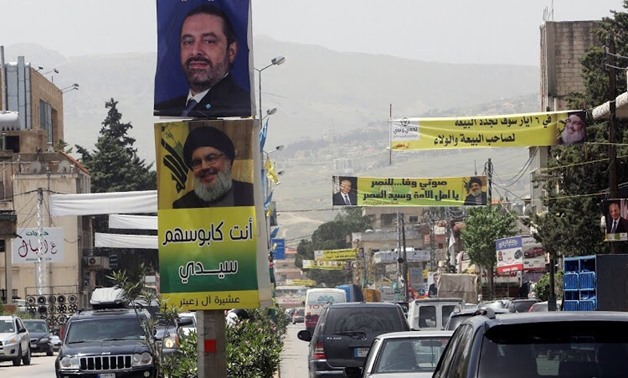
Posters of Lebanese Prime Minister and candidate for parliamentary election Saad al-Hariri, above, and Lebanon's Hezbollah leader Sayyed Hassan Nasrallah hang on poles along a street in Zahle, Lebanon, on May 4, 2018. Picture: REUTERS/AZIZ TAHER
CAIRO – 9 May 2018: Although the Shiite-oriented Hezbollah and its political allies achieved a significant victory in the parliamentary election held last Sunday, six female lawmakers succeeded to join the new Parliament for the first time in the Lebanese legislative history, compared to only four female parliamentarians in the 2009 Parliament.
Lebanese Prime Minister Saad Hariri announced on Monday that his Future Movement obtained 21 parliamentary seats. The statements came at a press conference in Beirut, where Hariri said that the parliamentary elections are "a great achievement that prevents the political vacuum."
"I am still an ally of Lebanese President Michel Aoun because this alliance achieves stability for the country," added Hariri, who also stressed that he may leave his post as Lebanon's premier if he does not "like the situation in the next stage".
The Iran-backed Hezbollah won more than half of the Parliament's seats, at least 67 seats in the 128-seat Parliament will be dominated by Hezbollah and its political allies, as state TV reports revealed on Monday.
 Slap Image: FrontPage of Pro-Hezbollah Al-Akhbar newspaper on May 7, 2018.
Slap Image: FrontPage of Pro-Hezbollah Al-Akhbar newspaper on May 7, 2018.
Celebrating the victory of the Shiite bloc in Lebanon, pro-Hezbollah newspaper, Al-Akbhar, published a picture of Hariri on Monday’s front page, under the headline of “The Slap”.
The election came amid severe disputes among the big powers in Lebanon, in the absence of the classical alliances and coalitions that Lebanon had been used to in the past years.
According to the new amended law, the Lebanese people cast their votes in 15 electoral constituencies, most notably the stronghold of the Hariri family, “Beirut II”, where Hezbollah’s political wings have sought to control and guarantee the loss of the Hariri family.
President Aoun called on Lebanese expats to take part in the electoral process and to “take advantage of this right for the first time in Lebanon’s electoral history.” Lebanese expatriates cast votes in the parliamentary election for the first time with new amendments to the election law, amid a fierce state of polarization between Lebanon’s political factions.
“The parliamentary polls are the only way to ensure democracy,” Aoun added in press statements prior to the voting day, urging Lebanese youth to participate intensively in the election.
According to the Lebanese constitution approved in 1943, Lebanon’s president is always a Maronite Christian, the prime minister a Sunni Muslim and the Parliament speaker a Shi'ite, as power is split among religious groups according to the quotas adjusted at the end of the 1975-1990 civil war.
The 128 seats in the parliament are split equally between Christians and Muslims: 64 for Christians and 64 for Muslims, including Druze. The parliamentary poll was postponed three times since 2009 over disputes among political factions about the electoral law.
 Lebanese Chart Image: A Chart published by Reuters illustrating the Lebanese Parliament's composition
Lebanese Chart Image: A Chart published by Reuters illustrating the Lebanese Parliament's composition
Lebanese women's participation in the poll has brought fresh faces to the parliament, most notably anchorwoman, Paula Yacoubian, who does not belong to the traditional political class. Females made up 50.8 percent of registered voters in 2018, according to the United Nations.
The 42-year old media figure has Armenian origins as her family survived the genocide.
 Lebanese TV journalist Paula Yacoubian is the only candidate from outside the traditional political class to have won a seat in Lebanon's election-AFP
Lebanese TV journalist Paula Yacoubian is the only candidate from outside the traditional political class to have won a seat in Lebanon's election-AFP
Lawyer Roula Tabsh also won a seat in the capital city as she ran on Hariri's Future Movement list; pledging to advocate for women's rights.
The 50-year-old politician, Sethrida Geagea, returned for a new term in Parliament, amid accusations of being anti-Muslim.
Inaya Ezzedine, 57, also won a seat in the Parliament. Ezzedine served as minister for administrative reform; she hails from Hezbollah's ally, Amal Movement.
Dima Jamali, who ran on the Future Movement's list, is also a fresh face in the Parliament and is representing Lebanon's second city, Tripoli.
PM Saad Hariri's aunt was re-elected and kept, for the fifth time, the seat she has held in Lebanon's southern district of Sidon.
After the assassination of her brother in 2005, she stopped wearing skirt-suits and make-up and began covering her hair with a traditional white headscarf.
 Bahia Hariri- AFP
Bahia Hariri- AFP





Comments
Leave a Comment